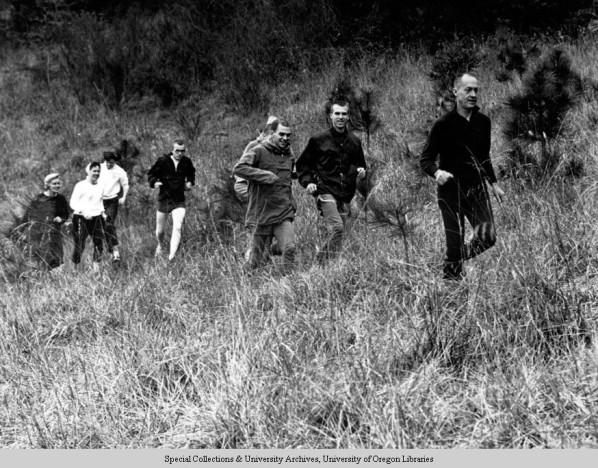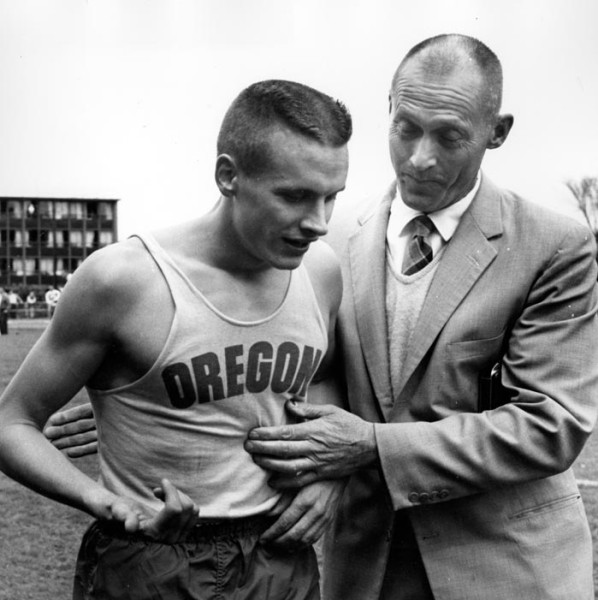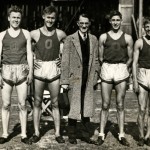Born: February 19, 1911
Died: December 24, 1999
Coaching Years: 1948-1972
Shaping a Leader
 Bill Bowerman strived to test the boundaries, once saying, “If there are limits to what we can do, I don’t know what they are.” From designing new running shoes to petitioning the AAU (Amateur Athletic Union) to improve athlete services, Bowerman forged ahead.
Bill Bowerman strived to test the boundaries, once saying, “If there are limits to what we can do, I don’t know what they are.” From designing new running shoes to petitioning the AAU (Amateur Athletic Union) to improve athlete services, Bowerman forged ahead.
An Oregonian through and through, Bowerman was born in Portland. He graduated from Medford High School, and completed his degree at the University of Oregon in 1935. Although Bowerman once dreamed of being a doctor, he chose the education route instead. He started his coaching career in Portland before moving onto Medford High School a year later, where he was the head football and track and field coach. Bowerman returned to the University of Oregon in 1948, and a year later took over the lead track and field coaching duties. Bowerman replaced John Warren, who had filled in for one year after the famous Bill Hayward retired.
Guiding Oregon to Prominance
 During his 24-year tenure as head coach, Bowerman not only led his teams to four NCAA Championships, but more importantly, he empowered average athletes to accomplish amazing feats. Standouts such as Jim Bailey, Bill Dellinger, Harry Jerome, Kenny Moore, and Steve Prefontaine were among the countless All-Americans and Olympians Bowerman mentored.
During his 24-year tenure as head coach, Bowerman not only led his teams to four NCAA Championships, but more importantly, he empowered average athletes to accomplish amazing feats. Standouts such as Jim Bailey, Bill Dellinger, Harry Jerome, Kenny Moore, and Steve Prefontaine were among the countless All-Americans and Olympians Bowerman mentored.
Bowerman did more than share his expertise with athletes-he offered his innovations and wisdom to the world. His portfolio of accomplishments include creating a high-altitude training program that was adopted by the U.S. Olympic Committee and serving as head track and field coach for the 1972 U.S. Olympic Team. Closer to home, Bowerman established the All-Comers Meets, community-wide track meets for all age levels, and was instrumental in transforming Eugene into “Tracktown, U.S.A.”
 A man committed to the community, Bowerman played a leading role Eugene’s bid to host the 1972, 1976 and 1980 Olympic Trials, numerous NCAA Championships, and the Pan-Am Games. He also orchestrated funding drives to renovate Hayward Field and to support local athletes’ in their athletic pursuits, including financial assistance for the Olympic Games.
A man committed to the community, Bowerman played a leading role Eugene’s bid to host the 1972, 1976 and 1980 Olympic Trials, numerous NCAA Championships, and the Pan-Am Games. He also orchestrated funding drives to renovate Hayward Field and to support local athletes’ in their athletic pursuits, including financial assistance for the Olympic Games.
Bowerman is perhaps best remembered by people who aren’t track and field fans for his contributions as a founder of Nike. A mastermind of running shoes, Bowerman devised his most notable creation, the waffle shoe, by pouring rubber into his wife’s waffle iron. True to his character, Bowerman did not seek fame or money. Rather, his ultimate goal was to create a running shoe that all children could afford.
After retiring from coaching in 1972, Bowerman continued to share his passion for teaching and innovation. He remained active in the University and served on the Board of Directors at Nike well into the 1990s. Although Bowerman passed away on December 26, 1999, his legacy continues to serve as an inspiration to all at to the University and to those involved in the track and field community.
Fun Facts
 Bowerman coached 24 individual NCAA champions, 33 Olympians, 64 All-Americans, 22 world-record holders and 25 U.S. record holders.
Bowerman coached 24 individual NCAA champions, 33 Olympians, 64 All-Americans, 22 world-record holders and 25 U.S. record holders.- Bowerman sold most of his shares in Nike® in the 1980s but remained on the Board of Directors, often adding his input into the areas he felt most passionate about, such as shoe design.
- Bowerman played many roles on the U.S. Olympic teams including serving as head coach during the 1972 Games in Munich and assistant coach during the 1968 Games.
- In 1991 the Bowerman Family Building was erected adjacent to Hayward Field. The complex houses offices, conference rooms and locker rooms.
- After studying the training tactics of Arthur Lydiard in New Zealand, Bowerman co-authored a 20-page pamphlet entitled “Jogging” upon his return in the 1950s.
- Bill Bowerman served as head coach for the 1972 U.S. Track and Field Olympic Team. Prior to that, Bowerman had been instrumental in establishing a high-altitude training program for the team. He also served on the USOC Board of Directors and assisted on other U.S. Olympic Track and Field teams. A passionate advocate for athletes, Bowerman continually fought for athletes’ rights-often criticizing the AAU for not treating the American athletes adequately. Bowerman also played a leading role in establishing the U.S. Track Team Exhibition Meets in Eugene in addition to assisting with the Olympic Trials bids and preparations.

- Bowerman originally wanted to go to medical school but decided teaching was a better fit.
- Bowerman was a standout football player in high school and college. It wasn’t until he crossed paths with Bill Hayward that he started competing in track and field.
- During the first decade of his coaching career, Bowerman made a name for himself as a football coach, leading Medford to several state titles.
- Medford High School did not have a track and field program until Bowerman established one in the spring of 1936.
- Bowerman was awarded the Bronze Star for Service for his combat efforts with the 10th Mountain Division in Italy in 1945.
- The first All-Comers Meet was held in Eugene during the spring of 1949 for grade school students-15 participants competed.
- Bowerman and Bob Newland founded the Emerald Empire Athletic Association (EEAA) in 1951. The organization is now known as the Oregon Track Club.
- In 1964, Phil Knight and Bowerman teamed up to start Blue Ribbon Sports, each contributing $500. Knight sold imported Onitsuki Tiger shoes from the trunk of his car. In 1971, Blue Ribbon Sports’ name was changed to Nike®, in reference to the Greek goddess of victory.
- Bowerman was not just a prized distance coach. He mentored champions in 15 of the 19-event track and field lineup.